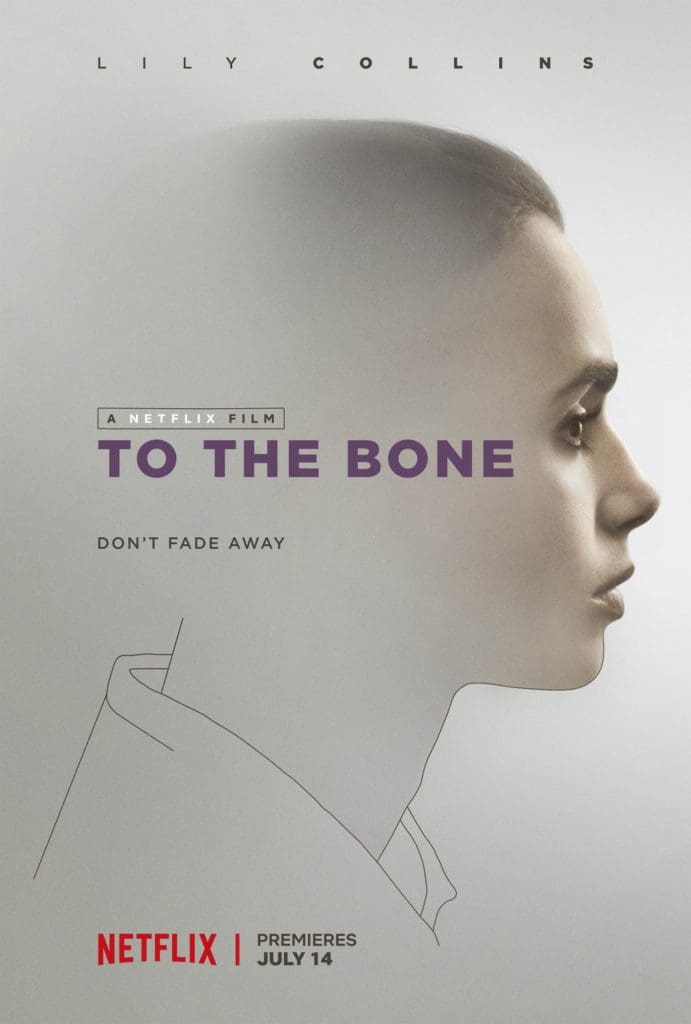Reviewing a film like To the Bone is always a challenge – particularly when it’s not all that good. A stark, uncompromising look at eating disorders, To the Bone has great intentions in trying to shine a light on an issue that has not been discussed much in mainstream entertainment media. Even better, it does so in a way that is raw, yet compassionate – disturbing, but with a sense of optimism that viewers will need, particularly if they’re young and suffer from an eating disorder themselves. But even the best intentions can’t make up for a flawed film, which makes writing this review something of a challenge.
The cinematic directorial debut of prolific TV producer Marti Noxon (Buffy, Mad Men, UnReal) stars Lily Collins as Ellen, a 20-year-old suffering from anorexia who is falling closer to rock bottom with each passing day. In a last ditch effort to save her life, Ellen’s stepmother puts her in the care of an unconventional but successful doctor (Keanu Reeves), and helps her find a community of her own in a therapy home populated with other young people suffering from eating disorders of their own.
Noxon, who suffered from an eating disorder herself, deserves praise for the way she handles the medical segments of the film. The film never exploits, or cheapens Ellen’s sickness, and highlights symptoms often ignored in previous depictions of anorexia. These scenes are uncomfortable, and some are even disturbing, but they all help bring eating disorders to light in a way that no movie ever has before. There are some moments that are simply devastating to watch, which makes the positive moments – like whenever Ellen or one of her peers comes closer to recovery – all the more powerful. Similarly, the scenes that grapple with Ellen’s home life, and how her inattentive parents deal with her mental illness, are some of the film’s strongest. All of these characters are flawed, but no one is judged for their actions or comments. The film is sympathetic to Ellen, and empathetic to her family, which makes for compelling domestic drama.
But the success of these scenes only makes the film’s problems more glaring: namely, the love story between Ellen and Luke, a ballerina and fellow anorexia patient staying in the same group home as her. Frankly, this subplot fails on just about every level. Luke is a poorly written character who fills whatever mold the screenplay needs him to fit at that moment. Sometimes he’s a source of inspiration, encouraging Ellen to inch closer to recovery. Other times, he’s a hopeless romantic calling to mind Augustus Waters from The Fault in Our Stars. He is even, occasionally, a sexist jerk who Ellen can tell off or call out. All three of these molds are fine on their own, but when a character constantly jumps between the three, it becomes frustrating. Even worse, the climax hinges largely on their relationship, which quickly sucks any momentum out of the final third. This entire ill-conceived romance feels like something shoehorned into the screenplay after The Fault in Our Stars found great financial success; it’s unnecessary, and does not work on any level.
Luckily, Lily Collins delivers consistently strong work throughout the film, even when the script hits a weak spot. This is Collins’ best work, and her first performance that hints at the type of career that is possible for the young actress. She’s funny, nails her dramatic beats, and deserves credit for her committed physical performance. It’s also worth noting that Keanu Reeves does a shockingly good job here, and both Leslie Bibb and Lili Taylor do well with the work they were given. It would have been nice to see those ladies get the amount of screen time that Luke was given.
Flaws and all, To the Bone is an important film for teens, families, and even some general viewers to watch. To paraphrase Roger Ebert, a movie can help create empathy in the hearts of its viewers, and To the Bone has the power to help its audience become more educated about eating disorders, and learn about both the symptoms and treatments of these problems without seeing it sensationalized. That makes it even more unfortunate to see how many missteps the film takes, specifically with regards to its love story. This film may be important, yes, but it could have been great, too.
Overall Rating: 5 out of 10


